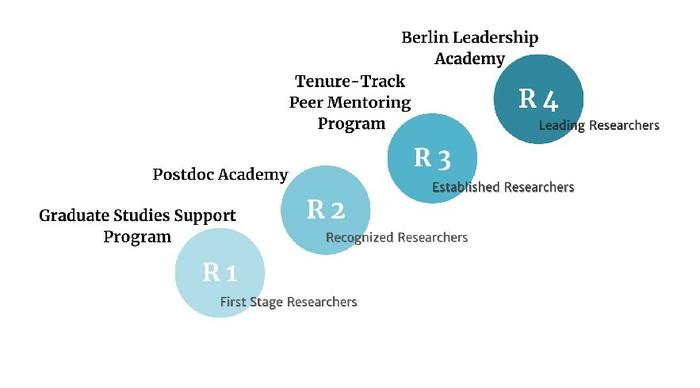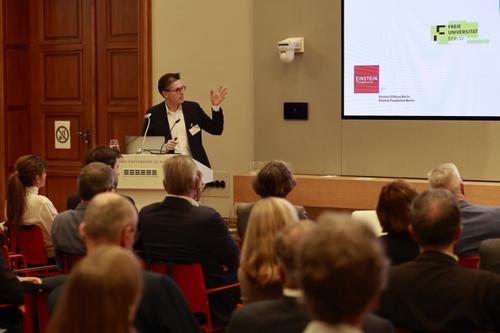A Research Career at the Berlin University Alliance
What Career Stage are you in?
-
R1 refers to first-stage researchers, typically PhD candidates who are beginning their academic research careers
-
R2 includes postdoctoral researchers who have completed their PhD and are gaining further research experience
-
R3 represents established researchers who may already be leading smaller research teams or supervising students
-
R4 designates leading researchers, such as full professors or senior group leaders, who are internationally recognized experts
Current Openings
Benefits of Working at the Berlin University Alliance
While salaries on paper may be higher at some universities in other countries, working in the German public university sector offers a host of attractive conditions that promote a healthy work-life balance and reduce transport, childcare or insurance expenses, to name a few. While benefits vary by institution and role, there are several common advantages that make Germany an appealing destination for researchers and professors:
Germany’s public health insurance system is widely regarded as one of the best in the world. University employees are typically enrolled in statutory health insurance plans, with the employer covering roughly half of the monthly premiums. This ensures high-quality, affordable healthcare for employees and their families.
Employees at German universities often qualify for discounted public transport passes, such as the regional or nationwide Jobticket, making commuting and travel within Germany highly cost-effective.
Family-friendly policies are a priority in the Berlin University Alliance institutions, with infrastructure such as parent-child rooms, childcare services, holiday programs and campus environments that welcome families. The Family Offices of the Berlin University Alliance are your first point of contact for how to better balance working life, studies and academic qualification processes with family responsibilities. In some cases, dual career services are available to assist with securing employment opportunities for spouses and partners of newly-arrived researchers.
- Freie Universität Dual Career & Family Service
- Humboldt-Universität Family Support Office
- Technische Universität Family Services Office | Dual Career Services
- Charité Administrative Office Family and Charité
Flexible work arrangements—including flexitime, partial home office and special leave options—are increasingly common. In many cases, staff can adjust their schedules to better balance professional and personal responsibilities. Requests for reduced working hours are often supported, particularly for those with caregiving duties.
Full-time employees in Germany are entitled to minimum of 20 annual paid vacation days, though the average in the public administration and education sector is 30, which is also typical across the Berlin University Alliance.
Many universities maintain extensive sports and wellness programs, including fitness courses, ergonomic consultations, mental health resources and health days promoting preventive care. The University sports programs of the Berlin University Alliance offer a particularly impressive variety of activities—from beach volleyball and yoga to sailing on local lakes and martial arts—many of which are available in English. Involvement in these programs is not only a great for your physical health and wellness; it is also a great way to meet new people and get to know Berlin beyond campus.
- Freie Universität Sports Program
- Humboldt-Universität Sport and Recreation
- Technische Universität Sports Program
- Charité-affiliated researchers should consult the HU and FU offerings
Continuing education is widely supported, with opportunities for skills development in leadership, research management and science communication, often supplemented by internal grants or stipends.
- Freie Universität Center for Continuing Education | Dahlem Center for Academic Teaching
- Humboldt-Universität Scientific Continuing Education
- Technische Universität Continuing Education for Employees
- Charité Further Training
Academic staff are usually employed under collective government tariff agreements like (Tarifvertrag für den öffentlichen Dienst der Länder), meaning they typically benefit from fixed, structured salary levels and, in many cases, annual one-off bonus payments based on their employment status.
Many institutions offer the option to participate in capital accumulation savings schemes (Vermögenswirksame Leistungen), similar to the 401-K, where the employer contributes monthly payments toward long-term financial plans.






